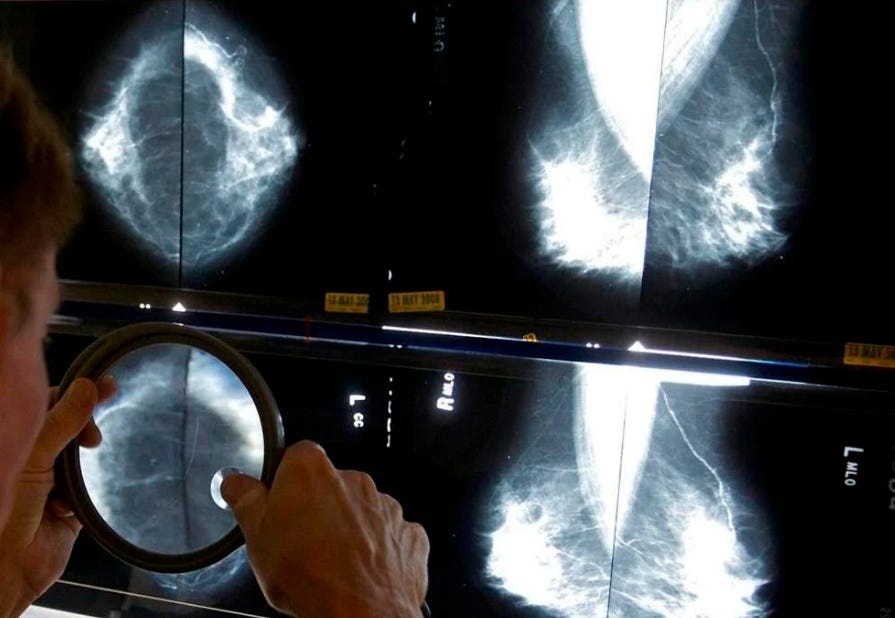You’re reading the web version of The Weekly Dose, our newsletter on health care and medical news. Sign up to get it next Sunday.
Hello Healthwatchers! 👨🏻⚕️
I’m back after last week’s hiatus with some wonderful news—we welcomed our baby boy last week, and everyone is doing great! Now, as I adjust to the joys (and sleeplessness) of being a new dad again, I’ve set aside some moments to dive back into the news with a few important updates. Let’s take a look.
Ottawa ramps up pandemic-readiness
This week, the federal government committed $575 million over four years to bolster the country's pandemic preparedness through various research and manufacturing initiatives.
Why it's important: The investment aims to bolster domestic vaccine production, clinical trials, and public health strategies. This may reflect some lessons learned back in 2021, when Pfizer pressed the feds for tax breaks during the first round of international procurements for COVID vaccines.
The funding, distributed across 19 projects at 14 institutions, is part of Ottawa’s effort to strengthen Canada’s response capabilities to emerging threats like H5N1. There’s significant focus on improving infrastructure and training scientists to expedite the development of therapies and vaccines. Key initiatives include setting up a cross-Canada bio-manufacturing cooperative and enhancing clinical trials for under-researched groups like children and pregnant women. Additionally, efforts are being funded to tackle our vaccine hesitancy challenges.
Read more…
Bird flu vaccines exist, but producing them could be a problem
Experts warn that despite the existence of H5N1 vaccine candidates, producing enough doses quickly in a pandemic scenario could be quite problematic.
Why it's important: Many countries have H5N1 vaccine stockpiles, or agreements in place with drugmakers to produce doses in the event of a pandemic. Canada doesn’t have a stockpile, and it’s also not known how effective present-day vaccines would be against future strains of H5N1.
Labs in Germany and Saskatchewan plan to use animal modeling and gain-of-function research to study the virus’s transmission, pathology and genetic adaptations. The U.S. just announced tighter rules regulating this controversial type of research to come into effect sometime in 2025, which may encourage more of it to take place within jurisdictions friendlier to the practice. Despite the threat H5N1 poses and the coordinated governmental and scientific efforts emerging to preempt it, a recent online poll suggests there’s a sizeable public knowledge gap, with most respondents opposed to funding national-scale H5N1 vaccination.
Read more…
What more private equity in healthcare means for Canadians
As U.S. lawmakers scrutinize private equity's impact on healthcare, Canada is seeing a growing influence of these firms in areas like orthopedic surgeries and long-term care, raising concerns over quality of care and fiscal transparency.
Why it's important: Private equity firms are buying up clinics for surgeries like hip and knee replacements, and make up a significant portion of the long-term care sector. The systemic impact of firms like Clearpoint, which owns 53 operating rooms across Canada, is growing.
Experts warn that while private equity aims to streamline and profit from healthcare services, perverse fiscal incentives coupled with the ability to obfuscate financial data may lead to reduced care quality and higher costs to taxpayers. Studies suggest negative impacts associated with this ownership model, with evidence pointing to declines in care quality in facilities owned by private equity. Transparency is also a concern, as private equity firms aren’t subject to the same rules and oversight as publicly traded companies.
Read more…
Family doctor group demands Ontario health minister's resignation over controversial comments
The Union of Family Physicians of Ontario is calling for Sylvia Jones' resignation following health ministry statements that downplayed concerns over the sustainability of family medicine in the province.
Why it's important: This is the latest drama to unfold as the government and the Ontario Medical Association renegotiate physician compensation. The ministry said last week there is "no concern of a diminished supply of physicians" and that recruiting and retaining family doctors in the province is “not a major concern.”
The ministry’s posture was met with outrage from family doctors, who say their take-home income has dropped by nearly 20% in the past four years, making the practice of family medicine financially unsustainable in the province. While Jones can point to provincial efforts to expand medical schools and residency spots, the primary care crisis remains acute, with projections indicating one in four Ontarians will lack a family doctor in two years’ time.
Read more...
Cancer Society urges earlier breast cancer screening at 40
The Canadian Cancer Society is advocating for all provinces and territories to lower the starting age for breast cancer screening from 50 to 40.
Why it's important: The change is based on strong evidence suggesting that earlier detection leads to less invasive treatments and better outcomes. 13% of breast cancer cases occur in women aged 40 to 49.
Advocates call for uniform access to screening nationwide, as access to mammography for women aged 40-49 differs greatly between provinces and territories. Despite the national guideline recommending that screening begin at age 50, the Task Force on Preventive Health Care is currently reviewing this stance, with an update expected soon. There’s also a push underway for primary-care providers to discuss screening options with women starting at age 40, noting that Black women are often diagnosed at younger ages with more advanced stages of the disease.
Read more…
RateMDs faces class-action lawsuit over possible privacy violations
A class-action against RateMDs, alleging the site violates the privacy rights of health professionals by publishing profiles and reviews without their consent, was certified by a B.C. Supreme Court judge this week.
Why it's important: The lawsuit claims the website infringes on the rights to privacy and misappropriation of personality, arguing that doctors are compelled to engage with the site to manage unverified reviews and rankings.
RateMDs contends that the information is publicly available and non-personal, but the judge acknowledged potential privacy law violations that seem to hinge upon the commercial nature of the site. The case could go nowhere, but it is interesting, with possibly widespread implications for online review platforms in the healthcare sector and beyond, depending on the ruling. I’ll be following this one.
Read more…
And there we have it for today’s update.
More good news: We’ve had a chance to review your survey feedback, and based on what we heard, we’ll be rolling out lots of useful changes to the site and app over the coming weeks. For now, here’s a handy H5N1 news-filter for those following it closely.
Until next time, take care, and cherish those moments of rest—I certainly will.
To the moms reading, happy Mother’s Day. 🧁
Nick Tsergas
National Health News Editor
Canada Healthwatch
[email protected] | canadahealthwatch.ca





